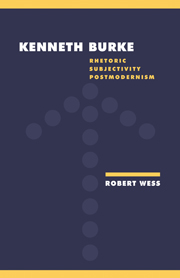Book contents
- Frontmatter
- Contents
- Preface
- Acknowledgments
- List of abbreviations
- 1 Ideology as rhetoric
- 2 Counter-Statement: aesthetic humanism
- 3 Permanence and Change: a biological subject of history
- 4 Attitudes toward History: the agon of history
- 5 The Philosophy of Literary Form: history without origin or telos
- 6 A Grammar of Motives: the rhetorical constitution of the subject
- 7 A Rhetoric of Motives: ideological and utopian rhetoric
- 8 The Rhetoric of Religion: history in eclipse
- Index
1 - Ideology as rhetoric
Published online by Cambridge University Press: 21 May 2010
- Frontmatter
- Contents
- Preface
- Acknowledgments
- List of abbreviations
- 1 Ideology as rhetoric
- 2 Counter-Statement: aesthetic humanism
- 3 Permanence and Change: a biological subject of history
- 4 Attitudes toward History: the agon of history
- 5 The Philosophy of Literary Form: history without origin or telos
- 6 A Grammar of Motives: the rhetorical constitution of the subject
- 7 A Rhetoric of Motives: ideological and utopian rhetoric
- 8 The Rhetoric of Religion: history in eclipse
- Index
Summary
When a bit of talking takes place, just what is doing the talking? Just where are the words coming from?… An “ideology” is like a spirit taking up its abode in a body: it makes that body hop around in certain ways; and that same body would have hopped around in different ways had a different ideology happened to inhabit it.
Burke, LSARhetoric has assumed a prominence unimaginable a generation ago. True, it is still mentioned pejoratively in everyday conversation and the media. But among theorists one now sometimes runs across the opposite extreme. Stanley Fish, for instance, in Doing What Comes Naturally, tells us that its basic message is that “we live in a rhetorical world.” Normally not part of the training of contemporary theorists, rhetoric is instead something encountered on the terrain of contemporary discourse, where it sometimes is and sometimes is not recognized by name. Samuel Ijsseling finds appeals to rhetoric – “direct or indirect” – in strategies used to bring traditional philosophy into question in “Nietzsche, Marx and Freud, and… in Heidegger and the various French authors who have been inspired by these thinkers, e.g. J. Derrida, R. Barthes, M. Foucault, J. Lacan and L. Althusser.”
Fish writes in “Rhetoric,” published for the first time in Doing, of some of the theorists responsible for the current rise of rhetoric, including “Kenneth Burke, whose ‘dramatism’ anticipates so much of what is considered avant-garde today.”
- Type
- Chapter
- Information
- Kenneth BurkeRhetoric, Subjectivity, Postmodernism, pp. 1 - 38Publisher: Cambridge University PressPrint publication year: 1996



